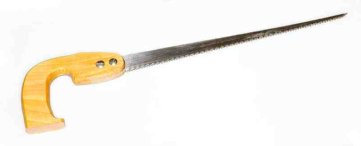|
Keyhole Saw Escape
The keyhole saw is called quite a few things, pad saw, drywall saw and alligator saw, probably because of the size of its teeth for such a small tool. Don't be frightened though the teeth get smaller towards the point. The blade measures up to 12" long and is either a fixed blade attached to a handle or retractable, the retractable being more expensive because of its movable parts. The padsaw is used to cut holes and curves in soft materials such as dry wall/plasterboard, soft board and plastics. Harder materials are very difficult to cut, I've tried but with minimal success and only used the tool because the proper one wasn't to hand. I use the pad saw mainly to cut dry wall boards around wall sockets, light fittings, switches and pipes. They can be cut with a Stanley knife but the pad saw is much quicker and easier to use, especially round holes. By using the end of the tapered blade, tight curves can be sawn however with the long blade be careful to keep the blade at 90 degrees to the cut as it has a tendency to flex and bend the blade. Push or PullI prefer the blade to cut on the push stroke for 2 reasons a.) So that I can always see the line to be cut. If I cut on the pull stroke the resulting burr or splinter will hide the line. b.) I always cut from the face side which I don't want to damage or spend time removing burr or spelches. The Western saw's teeth point away from the handle and is my preferred choice. The Japanese keyhole saw cuts on the pull stroke, the teeth pointing towards the handle. I have come across a saw which cuts both ways, which is the Silverline 868570, but I haven't used this tool. This is mainly because by cutting soft materials the blades last for ages. Temporary Keyhole SawShould you have a hacksaw blade, you could make your own similar tool. I made one by first cutting the length to 9", then grinding the back edge to a tapered point. To form the holding part I wrapped cloth around the blade secured by tape, giving me something substantial to grip and preventing cuts to my hands. This tool is ok for a temporary measure but you will find there is a lot of blade flexing and if you are not extremely careful the blade will snap. I will recommend however that you purchase the correct tool rather than make one, kehole saws are quite cheap to buy and much safer to use. Here is a link to a selection, by clicking on
keyhole saw From Keyhole Saw return to Woodworking Saws
|




